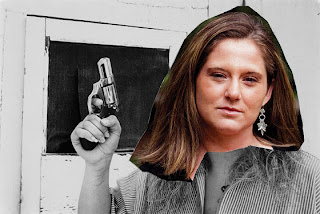
When did you start writing the book? I began writing Sexy Librarian in the summer of 2006, when I was traveling cross-country visiting public libraries for an art project I was working on. When I began the manuscript, I had no serious expectations for it to be published; my intention was to collect rejection letters from commercial publishing houses. I displayed these letters as art works within an exhibition about failed literature.
Did you use an agent?/How long did it take to find a publisher? I submitted the unagented manuscript for Sexy Librarian to six publishing houses: Harlequin, Tor, Avon, Dorchester, Moonlit Romance, and Triskelion. Each passed and notified me of their decision with standard form letters. Ellen Lupton, a curator, saw the rejection letters in my exhibition and offered to
publish the book independently. She hadn't read any content when she made the offer, but was interested in the potential for distributing the story in context of the overall project. More information about the original exhibition can be found here:
http://www.deaccession.org/
What prompted your interest in writing the manuscript if getting it published was somewhat of an accident? I am interested in understanding collective fantasy via the obscure, rather than the popular. I wanted to write a love story that was formulaic, but included anecdotes of my own life, to see if my experiences could be of value, commercially, to the paperback romance industry. The rejection of the manuscript revealed something about prescriptive desire and the hearts of the Midwestern women who fuel the paperback romance business. I learned, for example, that sexually transmitted diseases are considered a "turn off," within the Romance genre.
Where were you when you received the offer for the book to be published? I was at the opening of the exhibition in which the rejection letters were being shown. Ellen made a verbal offer to publish it, but I immediately declined, concerned as I was that the project stay true to its original intention of exploring failed literature within the mainstream commercial publishing world. It became clear quickly, however, that publishing the project independently could begin a new chapter. I am interested now in monitoring the book's success within public libraries. In this context readers can seek out the narrative without financial commitment.
Who was the first person you told about the book deal? I told my brother as we were heading to the show's after party. When Ellen sent me the contract, I sat down with my whole family and we reviewed it together. We had a long discussion about whether or not it was the right direction for the project. This was not a typical case of dreams coming true: I had never before imagined myself as a novelist. I'm a sculptor! But then I began to see the potential for the novel to be a sculpture, and that encouraged me to move forward with it.
How long did it take to finish the first draft? Because of our production schedule, I had only two months to write the first draft.
How many revisions did you write? Two.
Who read your drafts? Ellen edited the novel. Jennifer Tobias, art librarian extraordinaire and the book's critical essayist, provided a "library realness" edit. This involved fact checking things like whether or not it was structurally feasible that the steel cantilever shelving in the Minneapolis Public Library could hold the weight of a fornicating couple. My brother, who is an art writer and curator, also contributed an overall edit.
How did you decide which comments were important and which you didn't need to heed? I wanted to preserve the true character of the first three chapters—the proposal that I sent to the Slush pile—so that there could be transparency in terms of what they rejected. It was pretty rough stuff, though, so we had to compromise at times and edit those pages into more polished fiction.
Has your philosophy on getting published changed? Would you do anything differently now? I don't know if I would do anything differently. I believe the narrative is successful in preserving the raw vulnerability of offering this story up for public consumption, failing, and finding an outlet for more precisely judging it's potential relevance. There isn't just one moment in the publishing process when a writer can be rejected. If your book gets published, but no one reads it, that's another kind of heartbreak.
What words of advice would you give to a writer on the journey toward publication? Failure is funnier than success, and more romantic.
___________________
I love that rejection is incorporated into Julia's publication story as a positive force! That's good stuff. Go
here to buy a copy of Julia's fascinating book today.
 Commercial Magazines are in trouble this week with kiddie porn in Vanity Fair (though I happen to think the shot by Leibovitz was rather artful, but clearly against the kid's branding).
Commercial Magazines are in trouble this week with kiddie porn in Vanity Fair (though I happen to think the shot by Leibovitz was rather artful, but clearly against the kid's branding). 


































